Text
FAREWELL / BÚCSÚ
Thank you guys very much for following me throughout the ages. I decided to end this account and go on only with the Facebook and the Instagram accounts. If you’re interested, feel free to follow any of those two, or the blog, I will appreaciate it.
Thank you again. :)
16 notes
·
View notes
Photo

Én, aki egy szót sem tud magyarul
vs.
A barátom / barátnőm haverjai, rokonai:
"De kicsit már értesz magyarul, ugye?"
15 notes
·
View notes
Photo

királynő [ˈkiraːjnøː] – queen
(Literally: king-woman)
királyné [ˈkiraːjneː] – queen consort (the wife of a reigning king)
(Literally: king's wife)
király [ˈkiraːj] – king
nő [ˈnøː] – woman
-né [ˈneː] – wife of...
(For example: Kovács Istvánné – István Kovács's wife. This form is still used in Hungary in official occasions, where the wife is not called by her name (Kovács Eszter), but she is called as Kovács Istvánné.)
20 notes
·
View notes
Photo
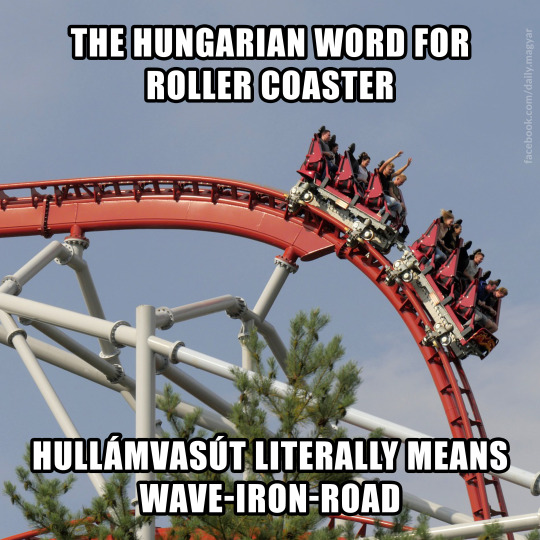
hullámvasút [ˈhulːaːmvɑʃuːt] – roller coaster
(Literally: wave-iron-road; wave-railway)
hullám [ˈhulːaːm] – wave
vasút [ˈvɑʃuːt] – railway
vas [ˈvɑʃ] – iron
út [ˈuːt] – way; road; trip; path
utazás [ˈutɑzaːʃ] – trip; journey; travelling
Photo: dlohner (Pixabay)
22 notes
·
View notes
Photo
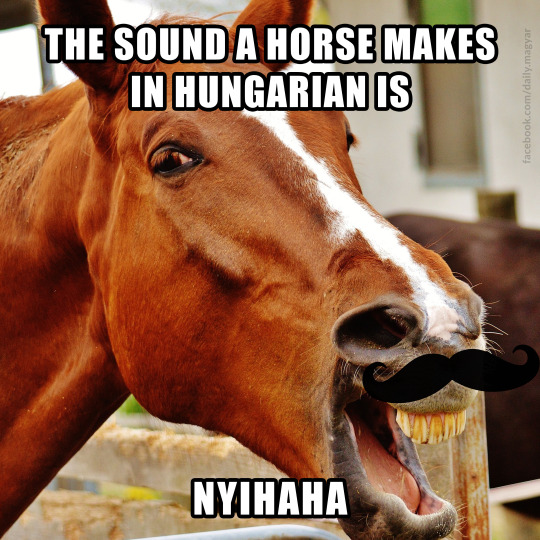
nyihaha [ˈɲihɑhɑ] – neigh (the sound of a horse)
nyerítés [ˈɲɛriːteːʃ] – neigh; neighing; whinnying; whinny
nyerít [ˈɲɛriːt] – he/she/it is neighing; he/she/it is whinnying
nyeríteni [ˈɲɛriːtɛni]
1) to neigh; to whinny
2) to laugh boisterously; to have a horselaugh
ló [ˈloː] – horse
lovak [ˈlovɑk] – horses
Photo: Hier und jetzt endet leider meine Reise auf Pixabay aber (Pixabay)
13 notes
·
View notes
Photo
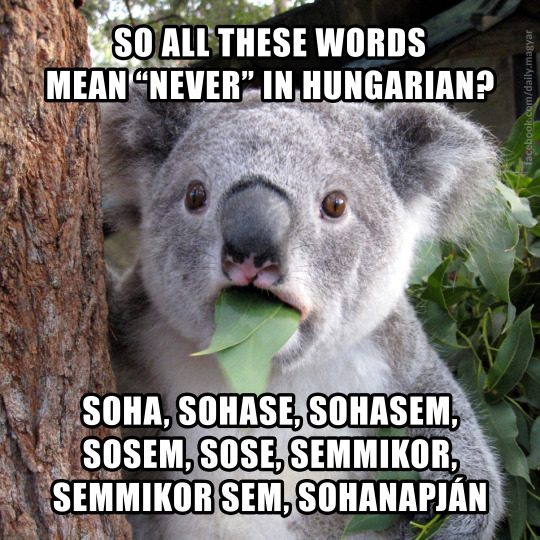
soha [ˈʃohɑ] – never
sohase [ˈʃohɑʃɛ] – never
sohasem [ˈʃohɑʃɛm] – never
sosem [ˈʃoʃɛm] – never
sose [ˈʃoʃɛ] – never
semmikor sem [ˈʃɛmːikor ʃɛm] – never; at no time
semmikor se [ˈʃɛmːikor ʃɛ] – never; at no time
semmikor [ˈʃɛmːikor] – never; at no time
semmi [ˈʃɛmːi] – nothing
kor [ˈkor] – age; era; period; epoch
sem [ˈʃɛm] – neither; not even
nem [ˈnɛm]
1) no
2) sex; gender
sohanapján [ˈʃohɑnɑpjaːn] – never; at no time
nap [ˈnɑp]
1) day
2) sun
11 notes
·
View notes
Photo
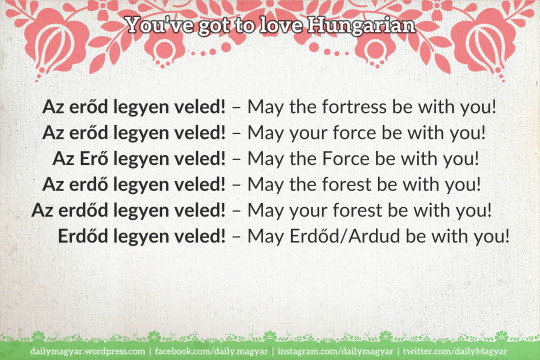
Az erőd legyen veled! [ˈɑz ˈɛrøːd lɛɟɛn vɛlɛd] – May the fortress be with you!
Az erőd legyen veled! [ˈɑz ˈɛrøːd lɛɟɛn vɛlɛd] – May your force be with you!
Az Erő legyen veled! [ˈɑz ˈɛrøː lɛɟɛn vɛlɛd] – May the Force be with you!
Az erdő legyen veled! [ˈɑz ˈɛrdøː lɛɟɛn vɛlɛd] – May the forest be with you!
Az erdőd legyen veled! [ˈɑz ˈɛrdøːd lɛɟɛn vɛlɛd] – May your forest be with you!
Erdőd legyen veled! [ˈɛrdøːd lɛɟɛn vɛlɛd] – May Erdőd/Ardud be with you!
erő [ˈɛrøː] – strength; force; power
erőd [ˈɛrøːd]
1) your force; your power
2) fortress; fort; stronghold
erdő [ˈɛrdøː] – forest
erdőd [ˈɛrdøːd] – your forest
Erdőd [ˈɛrdøːd] or Ardud, a town situated in Romania.
22 notes
·
View notes
Photo
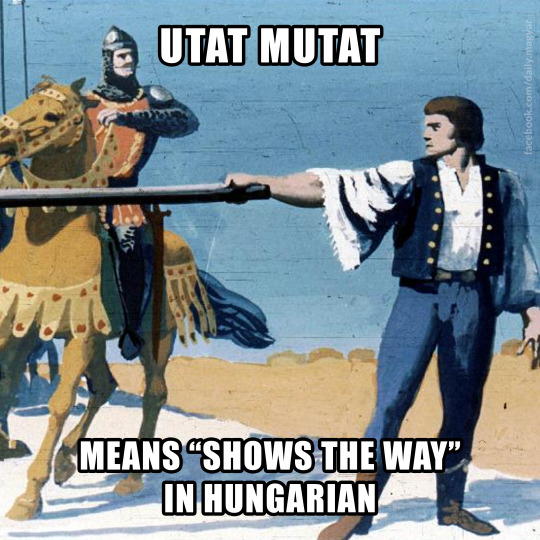
mutatja az utat [ˈmutɑtcːɑ ɑz utɑt] – (he/she/it) is showing the way
utat mutat [ˈutɑt mutɑt] – (he/she/it) shows the way; guides the way; leads on
utat mutatni [ˈutɑt mutɑtni] – to show the way; to lead on; to guide the way
utat mutató [ˈutɑt mutɑtoː] – way-leading; way-pointing
útmutató [ˈuːtmutɑtoː] – guide; guideline
út [ˈuːt]
1) way; road; path
2) track; trip; voyage (also as "utazás")
mutatni [ˈmutɑtni] – to show; to indicate
The image depicts a scene from the narrative poem "Toldi" written by János Arany in 1846, where Palatine Laczfi asks the main character, Miklós Toldi, disdainful "Hey peasant, where's the road to Buda?". The word cut to Toldi's heart, so he lightly twirls a pole, grabbing one end like a little stick, and with a single hand he raises it up long and straight, pointing out the road that trails toward Buda. Arm hardening into iron, and himself, he extends the rough-hewn timber straight as a rod. (Read more here.)
Image: Sándor Benkő's dia film strip.
12 notes
·
View notes
Photo

hulló [ˈhulːoː] – falling
hüllő [ˈhylːøː] – reptile
hűlő [ˈhyːløː] – growing cold; cooling
hullani [ˈhulːɑni]
1) to fall (snow)
2) to flow (tears) [e.g.: hullanak a könnyeim – my tears are flowing]
3) to fall out (hair) [e.g.: hullik a hajam – my hair is falling out/falls out]
4) to die [e.g.: hullanak, mint a legyek – they are dying off like flies]
hűlni [ˈhyːløː] – to grow cold; to get cool
hűvös [ˈhyːvøʃ] – cool (weather)
hűs [ˈhyːʃ] – cool (weather)
hűsölni [ˈhyːʃølni] – to rest in the shade; to rest in a cool place
16 notes
·
View notes
Photo
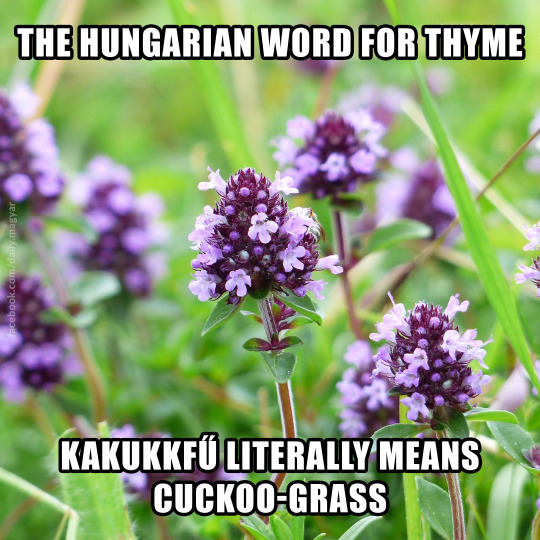
kakukkfű [ˈkɑkukːfyː] – thyme
kakukk [ˈkɑkukː] – cuckoo
fű [ˈfyː] – grass
Photo: Hans Braxmeier (Pixabay)
19 notes
·
View notes
Photo

Not to be confused with the English word "pussy". ;)
puszi [ˈpusi] – peck :*
pusszancs [ˈpusːɑntʃ] – peck; kiss (slang)
megpuszilni [ˈmegpusilni] – to give a peck
csók [ˈtʃoːk] – kiss
csókolózni [ˈtʃoːkoloːzni] – to be kissing; to be snogging
csókolódzni [ˈtʃoːkoloːdzni] – to be kissing; to be snogging (archaic)
csókolódzás [ˈtʃoːkoloːdzaːʃ] – kissing; snogging (archaic)
csókolózás [ˈtʃoːkoloːzaːʃ] – kissing; snogging
megcsókolni [ˈmegtʃoːkolni] – to kiss
163 notes
·
View notes
Photo
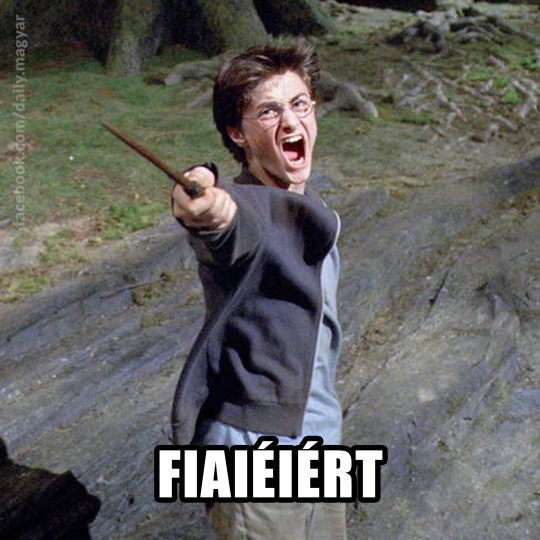
fiaiéiért [ˈfiɑieːieːrt]
– for his/her sons’ (things); for those (things) that belong to his/her sons
fiaiéi [ˈfiɑieːi]
– his/her sons’ (many things – plural subject) (e.g.: those things are her sons’)
fiaiért [ˈfiɑieːrt] – for his/her sons
fiaié [ˈfiɑieː] – his/her sons’ (one thing – singular subject belonging to his/her sons)
fiai [ˈfiɑi] – his/her sons
fia [ˈfiɑ] – his/her son
fiaé [ˈfiɑeː]; fiáé [ˈfiaːeː] – his/her son’s (singular subject)
(e.g.: that thing is her son’s)
fiaéi [ˈfiɑeːi]; fiáéi [ˈfiaːeːi] – his/her son’s (plural subject)
(e.g.: those things are her son’s)
fiaéiért [ˈfiɑeːieːrt]; fiáéiért [ˈfiaːeːieːrt] – for his/her son’s (things); for those (things) that belong to his/her son
fiú [ˈfiuː] – boy
For example:
- Az egyenruhákat osztogatták. Dóra a fiaiéiért jött. – They were handing out the uniforms. Dóra came for her sons’.
- Mindent megtenne a fiaiért. – She would do everything for her sons.
21 notes
·
View notes
Photo

A macska rúgja meg! [ˈɑ mɑtʃkɑ ruːgjɑ meg]
(Literally: May the cat kick it!)
This old-fashioned and mild Hungarian swearing can be used as a replacement for "Damn!", "Damn it!".
macska [ˈmɑtʃkɑ] – cat
rúgni [ˈruːgni] – to kick
Photo: photosforyou (Pixabay)
36 notes
·
View notes
Photo
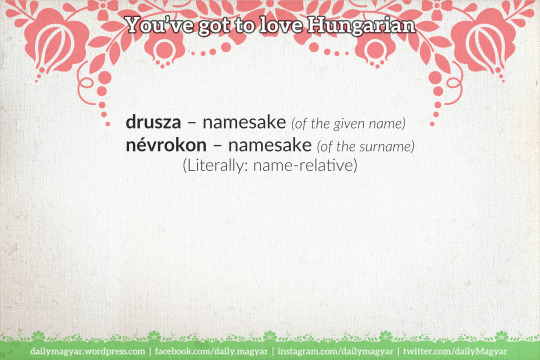
drusza [ˈdrusɑ] – namesake (of the given name)
névrokon [ˈneːvrokon] – namesake (of the surname)
(Literally: name-relative)
R.I.P. Lajos Ádám, dance teacher, my névrokon, who's taught our class different dances for our elementary school senior prom night. As he did teach many generations of mainly Hungarians in South Slovakia during his long carreer: article 1, article 2 (both in Hungarian)
név [ˈneːv] – name
rokon [ˈrokon] – relative
15 notes
·
View notes
Photo
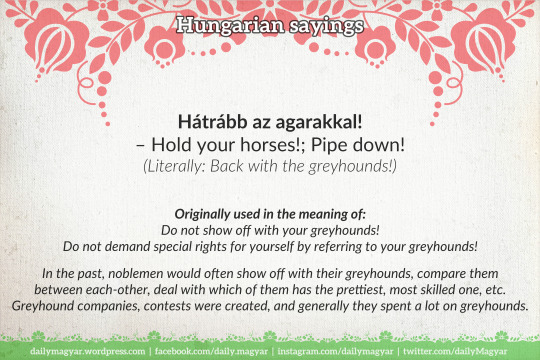
Hátrább az agarakkal! [ˈhaːtraːbː ɑz ɑgɑrɑkːal] – Hold your horses!; Pipe down!; Be more modest! (rather archaic saying)
(Literally: Back with the greyhounds!)
Hátrébb az agarakkal! [ˈhaːtreːbː ɑz ɑgɑrɑkːal] (dialectical version)
This saying was originally used in the meaning of: Do not show off with your greyhounds!; Do not demand special rights for yourself by referring to your greyhounds!
In the past, noblemen would often show off with their greyhounds, compare them between each-other, deal with which of them has the prettiest, most skilled one, etc. Greyhound companies, contests were created, and generally they spent a lot on greyhounds.
hátrább [ˈhaːtraːbː]
1) aback; more to the back
2) backwards; move back; back
hátra [ˈhaːtrɑ] – to the back; backward
hát [ˈhaːt]
1) back (part of body)
2) well...
agár [ˈɑgaːr] – greyhound; sighthound
Hungarian explanation here.
17 notes
·
View notes
Photo
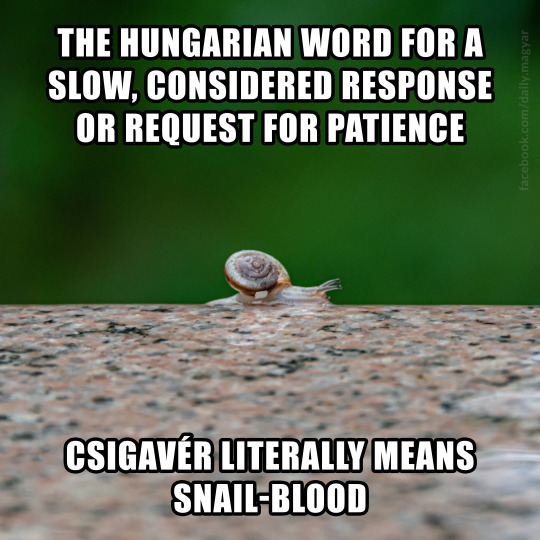
csigavér [ˈtʃigɑveːr]
1) slow, calm, considered response
2) Relax!; Hold your horses!; Patience!; Chill out!; Calm down!; No hurry!
csiga [ˈtʃigɑ]
1) snail
2) pulley (one of the simple machines)
3) (anatomy) cochlea (spirally coiled cavity of the inner ear)
vér [ˈveːr] – blood 🩸
Photo: Ray Zhou (Unsplash)
17 notes
·
View notes
Photo
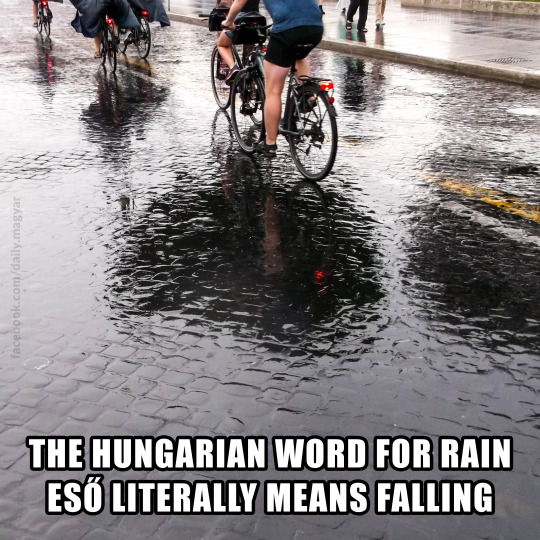
eső [ˈɛʃøː]
1) rain
2) falling (adjective)
esik [ˈɛʃik]
1) it’s raining
2) he/she/it is falling; he/she/it falls
esni [ˈɛʃni]
1) to fall
2) to rain
3) to make somebody feel somehow
(e.g.: Hogy esne neked, ha…? – How would you like/feel if …?)
4) (intransitive) to happen
(e.g.: Úgy esett, hogy … – It happened that …)
Photo: Gabriel Ádám - linkingabo
15 notes
·
View notes